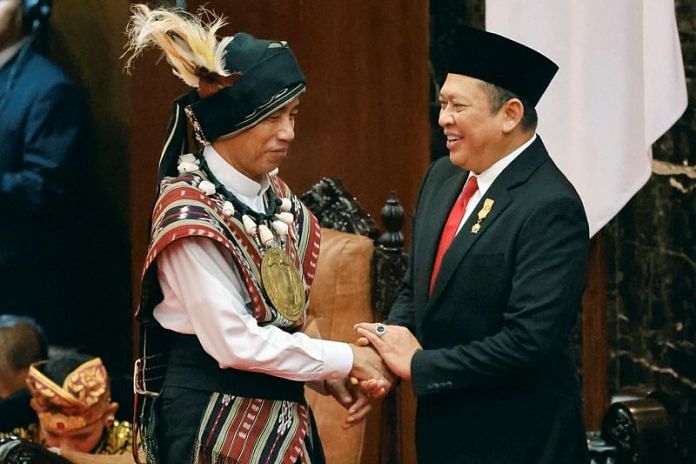By Stefanno Sulaiman and Stanley Widianto
JAKARTA (Reuters) -The speaker of Indonesia’s upper house of parliament said on Wednesday it was important for the country to discuss ways to delay elections during crises, as well as restore the legislative body’s position as the state’s highest institution.
Analysts have said restoring the upper house’s position could lead to the end of direct elections of the president.
Indonesia currently has no framework to postpone an election and some politicians have called for the constitution to be amended in future to allow a delay in an emergency.
Indonesia, the world’s third-largest democracy, will hold a general election on Feb. 14 next year, during which a successor will be chosen to replace President Joko Widodo, whose second and final term ends next year.
“How do we hold elections in the case of unexpected events occurring, like big natural disasters, wars, revolts, or pandemics,” Bambang Soesatyo, the upper house speaker, said in an annual address ahead of Indonesia’s Independence Day.
“This is important for us to think about and discuss together.”
Repeated talk among politicians about the potential to delay an election has been a thorny issue in Indonesia, where there has been on-off speculation of manoeuvring by the president’s allies to allow him to stay on beyond his second term, so he can complete his economic agenda.
Jokowi, as the president is popularly known, has repeatedly denied he wants to serve longer.
Parliament last week agreed on a plan to change the constitution to allow for a delay in the event of an emergency, but only after the 2024 elections were over.
Bambang said the upper house needs to “ideally” be restored as the state’s highest institution so that it can make emergency decisions during such crises. Currently the upper house is equal to the executive branch of government.
Law and election experts raised alarm over the idea, saying that could give the house the power to end direct elections.
During the authoritarian rule of President Suharto, the upper house was the highest state institution and it was the sole institution that picked the president. Indonesians voted for a president for the first time in a direct election in 2004.
Law experts and activists have previously said that any attempt to delay elections to allow a president to extend their stay in office would undo democratic gains achieved after the 1998 fall of Suharto.
(Reporting by Stefanno Sulaiman, Gayatri Suroyo, Stanley Widianto, Ananda Teresia)
Disclaimer: This report is auto generated from the Reuters news service. ThePrint holds no responsibilty for its content.



